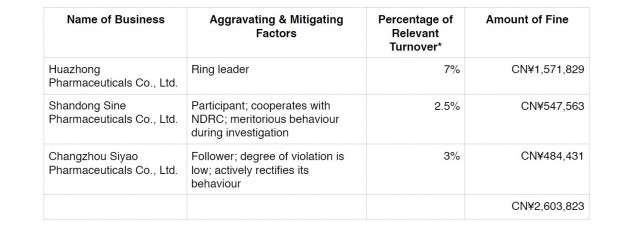On 27 July 2016, the National Development & Reform Commission (“NDRC”) publicised decisions finding three Pharma companies, Huazhong Pharmaceuticals Co., Ltd., Shandong Sine Pharmaceuticals Co., Ltd., and Changzhou Siyao Pharmaceuticals Co., Ltd., wrongful of concluding and implementing restrictive agreements on Estazolam active pharmaceutical ingredients (“API”) and tablets. The three companies received fines totalling CNY 2.6 million (USD 394K) for their wrongful behaviour violating the PRC Antitrust Law.
Background
Estazolam is used to treat anxieties for its sedative, hypnotic, anti-anxiety effects. It is one of the Category 2 psychotropic drugs under stringent control by China in terms of the market entry and production of their APIs. Only 4 businesses in China have licence to manufacture Estazolam APIs. The three companies mentioned above are the only ones that are actually manufacturing it. The three companies also manufacture the Estazolam tablets at the same time.
China operates a "Low Price Drug Catalogue" and the Estazolam tablets are listed in this catalogue as a drug that is under price control in China. Additionally, the Estazolam tablets are also listed in the National Essential Drugs Catalogue (2012 Version) of China.
NDRC has recently published the "Notice on the Launch of Nation-Wide Inspection on Drug Price" (NDRC Price Supervision No. [2016]1101) initiating regulatory activities on drug prices across China starting from 1 June 2016. According to this Notice, the regulating focus will be on APIs and the types of drugs that display abnormal fluctuation in price and receive strong discontents from the general public and businesses. It can be reasonably expected that the pharma industry is experiencing a wave of probes into their pricing practice.
Facts
The investigations of NDRC found that, after China issued its low-priced drug policy in 2014, the three companies concluded and implemented, by means of meetings, phone calls, text messages and emails, restrictive agreements that jointly boycott other Estazolam tablet manufacturers in the Estazolam API market and restrictive agreements that fix or change the price of Estazolam tablets.
The sales records of the APIs of the three companies obtained by the NDRC show that during 2013-2014, the three companies supplied APIs to 16 downstream tablet manufacturers, whereas starting from October 2014, the three companies gradually ceased their supply of APIs to external parties other than themselves. This has resulted in the cessation of manufacturing activities of 14 tablet manufacturers affected. At the same time, starting from December 2014, the Estazolam tablets manufactured by the three companies have displayed significant increase in price and such increases show a high degree of consistence in timing.
The Illegal Conduct
The NDRC found that the three companies conducted meetings in hotel rooms on arrangements of the Estazolam APIs and tablets and reached an "Oral Sales Pact” involving:
(1) the Estazolam APIs manufactured by each participant shall be for the sole use of each participant, no APIs may be sold to any 4th party other than the three participants;
(2) no participant may lower their prices without authorisation.
The Findings
The NDRC found the three companies, as competitors in the market of Estazolam APIs and tablets, violated Article 13(1)(a) and Article 13(1)(e) Anti-Monopoly Law, respectively for price-fixing agreements and collective boycott. In particular, acquiescence was reached among the three companies on collectively raising the price for Estazolam tablets - in the sense that one of the participants proposed raising the price of the Estazolam tablets to CNY 0.1 per tablet, although there being no agreement on such price increase, the price level of the Estazolam tablets of the three companies have all been increased to CNY 0.1 per tablet in effect.
Fining
The NDRC, taking into consideration the various aggravating and mitigating factors including the nature, degree, duration, roles, level of cooperation, etc., imposed different level of fines on the three businesses (see table below for the considerations of the NDRC in determining fines).
* Relevant Turnover is assessed as the sales volume of Estazolam tablets in Year 2015.
Comments
Like in other major competition law jurisdictions, China's Anti-Monopoly law punishes restrictive agreements that fix prices and collectively boycott other competitors as such agreements harm competition and consumer welfare.
Businesses are advised not to presume that "restrictive agreements" only refer to those agreements inked, signed, stamped by the cartel participants or concluded orally. "Concerted practice" is a very broad term designed to catch cartel activities that are conducted in the form of virtually all types of interactions among competitors, for instance in this particular case, the three cartel participants did not reach an agreement on the target price of increase of the tablets, however the oral proposal by one of them was subsequently followed by the other participants and this acquiescence resulted in concerted practice where the participants all acted in the same way reflecting that acquiescence however tacit it might have been.
While collectively boycotting others by competitors are unlawful practices, China's Anti-Monopoly Law does not punish reduction or cessation of supplying to others when such decision is made independently, provided of course such independent decision does not constitute abuse of dominance by refusing to deal with others as prescribed in Article 17(3) of the AML.


